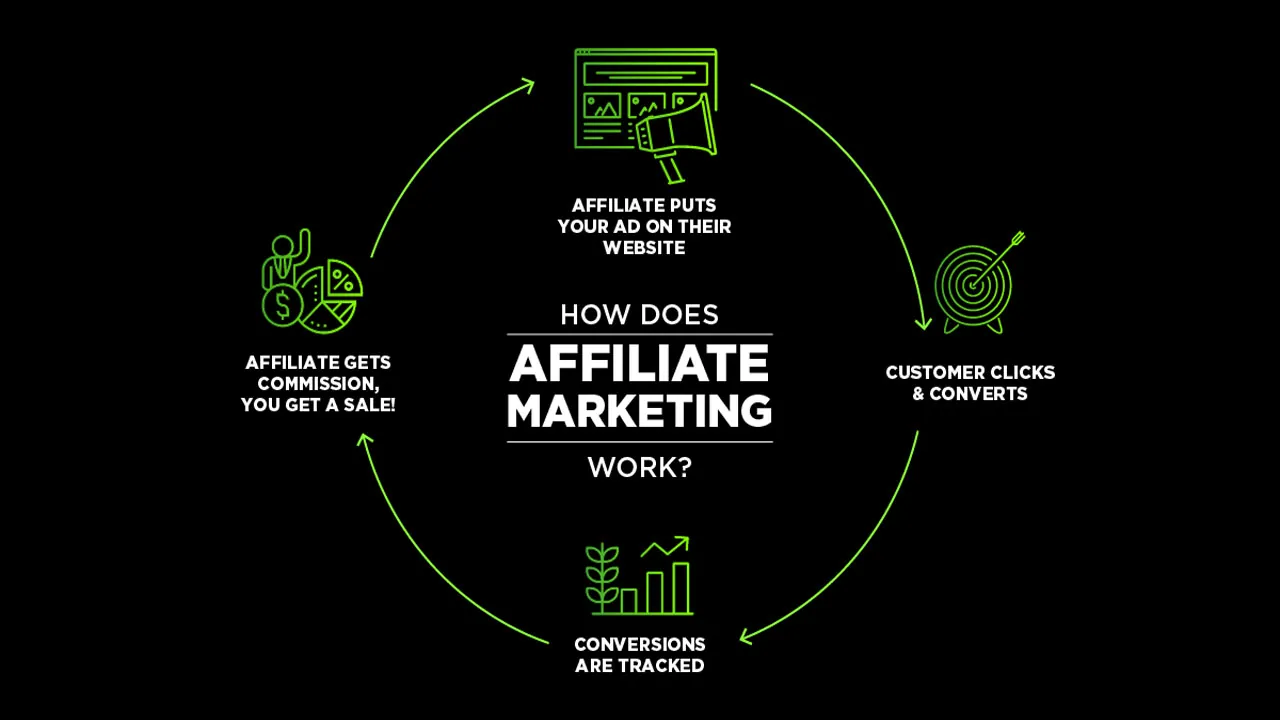What is Affiliate Marketing?
Affiliate marketing is a performance-based marketing strategy where a business rewards its affiliates for every customer or visitor brought by their marketing efforts. Essentially, an affiliate is someone who promotes the products or services of another company and earns a commission on any resulting sales or conversions.
In affiliate marketing, the affiliate promotes the products through various marketing channels, such as their website, social media, email marketing, or any other form of digital marketing. When a visitor clicks on the affiliate’s unique affiliate link and purchases a product or service, the affiliate earns a commission on the sale.
The commission rate can vary based on the affiliate program, and it can be a percentage of the sale or a fixed amount per sale or lead. Affiliate marketing is a cost-effective way for companies to market their products, as they only pay for successful conversions or sales. It is also a way for individuals or businesses to earn passive income by promoting products or services that align with their niche or audience.

Types of Affiliate Marketing
There are several types of affiliate marketing, each with its own unique characteristics and requirements. Some of the most popular forms of affiliate marketing are listed below:
- Pay-per-click (PPC) affiliate marketing:
In this type of affiliate marketing, the affiliate receives a commission for each instance when a user clicks on their affiliate link. This method is commonly used in advertising campaigns that aim to generate website traffic.
- Pay-per-lead (PPL) affiliate marketing:
In PPL (Pay-Per-Lead) affiliate marketing, the affiliate receives a commission when a user signs up for a service or provides their contact information. This approach is commonly utilized in lead generation campaigns.
- Pay-per-sale (PPS) affiliate marketing:
PPS is the most common type of affiliate marketing, where the affiliate earns a commission when a user makes a purchase through their affiliate link.
- Two-tier affiliate marketing:
In this form of affiliate marketing, affiliates earn commissions not only from their own sales but also from the sales generated by other affiliates they refer to the program. This approach is commonly employed to incentivize affiliates to recruit and onboard new affiliates to the program.
- Multi-level marketing (MLM):
MLM (Multi-Level Marketing) is a specific type of affiliate marketing where affiliates are encouraged to recruit other affiliates to promote a product or service. In MLM, affiliates earn commissions not only on their own sales but also on the sales generated by their recruits or downline. This creates a multi-level structure where affiliates can benefit from the sales efforts of their downline, creating additional income streams beyond their own direct sales.
- Influencer marketing:
Influencer marketing is a type of affiliate marketing where social media influencers promote a product or service to their followers. The influencer will earn a commission for any sales made through their unique affiliate link.
These are some of the most common types of affiliate marketing. It’s essential to understand the different types and choose the one that best suits your business and marketing goals.
Steps to get started with Affiliate Marketing
Here are the steps to get started with affiliate marketing:
- Choose a niche:
The initial step involves choosing a niche or subject that you are passionate about and where you possess expertise. This ensures a smoother process of content creation and enables you to provide product recommendations more effectively.
2. Research affiliate programs:
After selecting your niche, conduct thorough research on the different affiliate programs accessible within that specific industry. Look for programs that provide high commission rates, excellent product quality, and reliable support.
3. Create a website or blog:
To effectively promote the products and services you are affiliated with, it is essential to have a platform in place. One option is to establish a website or blog where you can offer product reviews, valuable information, and share your affiliate links.
4. Create valuable content:
In order to attract visitors to your website, it is crucial to generate valuable content that offers helpful information to your intended audience. This can encompass a wide range of content types, such as product reviews, tutorials, and guides.
5. Drive traffic to your site:
To generate sales, it is necessary to drive traffic to your website. This can be achieved through various methods including search engine optimization (SEO), social media marketing, email marketing, and paid advertising. These strategies can effectively increase the visibility of your website and attract potential customers.
6. Promote affiliate products:
Once your website attracts traffic, you can begin promoting affiliate products. It is important to be transparent about your affiliation by disclosing that you are an affiliate. Additionally, it is crucial to provide honest reviews and recommendations to build trust with your audience.
7. Track your results:
Utilize analytics tools to monitor and track your results, which include metrics such as clicks, conversions, and earnings. This valuable data can be used to optimize your strategy and enhance your overall performance. By analyzing these metrics, you can identify areas of improvement, make data-driven decisions, and fine-tune your approach to achieve better outcomes.
When executed correctly, affiliate marketing has the potential to be a profitable online business. It involves selecting a suitable niche, identifying appropriate affiliate programs, and implementing effective promotional strategies. By carefully considering these factors and making informed decisions, you can establish a thriving affiliate marketing business that brings you success and financial rewards.
Pros and Cons of Affiliate Marketing
Like any marketing strategy, affiliate marketing has its pros and cons. Here are some of the most common advantages and disadvantages of affiliate marketing:
Pros:
- Low startup costs: Affiliate marketing is a low-cost way to start a business, as there are no product development or inventory costs involved. You can start promoting products immediately with little to no upfront investment.
- Passive income: Once your affiliate marketing system is established, you have the opportunity to earn passive income by promoting products that align with the interests of your audience. This means that even when you are not actively promoting the products, you can still earn commissions. By creating a solid foundation and consistently delivering valuable content to your audience, you can enjoy the benefits of passive income through affiliate marketing.
- Flexibility: One of the advantages of affiliate marketing is the flexibility it offers. You can work from anywhere and at any time with just an internet connection. You have the freedom to choose the specific products you want to promote and the marketing channels you wish to utilize. This flexibility allows you to tailor your affiliate marketing business to suit your preferences and work according to your own schedule.
- Scalability: Affiliate marketing provides a scalable business model, as you have the ability to promote multiple products or services to your audience. This means that as your business grows, you can expand your portfolio of affiliate offerings and reach a wider range of customers. By diversifying your promotions and leveraging your existing audience, you can effectively scale your affiliate marketing business and increase your earning potential.
Cons:
- Dependency on merchants: Affiliate marketers rely on the merchants to provide quality products and to pay commissions on time. If the merchant doesn’t fulfill their end of the agreement, the affiliate’s reputation and income can be affected.
- Competition: Affiliate marketing is a popular way to make money online, which means there’s a lot of competition. You’ll need to work hard to stand out from the crowd and to build a loyal audience.
- Commission rates: The commission rates for affiliate marketing can vary, and some products may only offer a low percentage of the sale. This means you may need to sell a lot of products to earn a substantial income.
- Compliance: Affiliate marketing requires compliance with regulations and laws such as the FTC guidelines on affiliate marketing. You’ll need to stay up-to-date on these guidelines and ensure that your marketing practices are ethical and legal.
In summary, affiliate marketing can be a lucrative way to earn passive income with low start-up costs, but it requires hard work, dedication, and compliance with legal guidelines.






